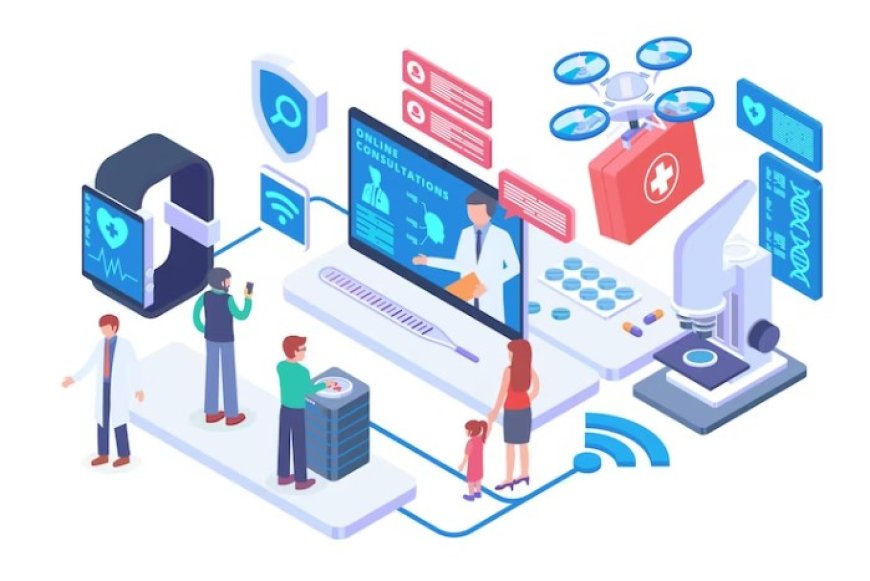Cyber Security In The Healthcare Industry
Explore cyber security, healthcare, data protection, threats, privacy, compliance, best practices, encryption, technology, safety, and risk management.

In today's digitally-driven healthcare landscape, the protection of sensitive data and critical systems is of paramount importance. Cyber security in the healthcare industry refers to the practices, measures, and technologies implemented to safeguard patient information, medical devices, and healthcare infrastructure from cyber threats. It encompasses a range of strategies, including data protection, network security, and risk management, aimed at ensuring the confidentiality, integrity, and availability of healthcare data and systems. With the increasing adoption of electronic health records and interconnected medical devices, the need for robust cyber security measures in healthcare has become more critical than ever.
Importance of Cyber Security in the Healthcare Industry
The importance of cyber security in the healthcare industry cannot be overstated. Here are some key reasons why it is crucial:
Protection of sensitive patient data:
Healthcare organizations handle vast amounts of sensitive information, including personal health records, medical histories, and financial data. Robust cyber security measures are essential to protect this data from unauthorized access, breaches, and theft.
Prevention of unauthorized access to medical systems and devices:
Healthcare facilities rely on interconnected systems and devices, such as electronic health records and medical devices, to provide quality care. Cyber security helps prevent unauthorized access and tampering with these critical systems, ensuring the integrity and availability of patient care.
Mitigation of potential financial and reputational damage:
A cyber attack on a healthcare organization can result in significant financial losses, legal liabilities, and damage to its reputation. Implementing robust cyber security measures helps mitigate these risks and protect the organization's financial well-being and reputation.
Safeguarding patient safety and well-being:
Cyber security vulnerabilities can pose a threat to patient safety. For example, if medical devices are compromised, patient health and well-being may be at risk. By prioritizing cyber security, healthcare organizations can ensure the safety and well-being of their patients.
Common Cyber Security Risks in the Healthcare Industry
The healthcare industry faces various cyber security risks that can have severe consequences. Here are some common risks:
-
The theft or unauthorized access of sensitive patient data is a significant concern in the healthcare industry. Data breaches can lead to the exposure of personal health information, financial details, and other confidential data, resulting in privacy violations and potential identity theft.
-
Ransomware is a type of malicious software that encrypts a healthcare organization's data, rendering it inaccessible until a ransom is paid. Ransomware attacks can disrupt critical healthcare services, compromise patient care, and cause financial losses.
-
Many medical devices used in healthcare settings are connected to networks, making them potential targets for cyber attacks. Exploiting vulnerabilities in these devices can lead to patient safety risks, data breaches, and even the manipulation of medical treatments.
-
Insider threats involve malicious or negligent actions by individuals within the healthcare organization. These individuals may intentionally misuse their access privileges to steal or manipulate data, or they may inadvertently expose sensitive information through careless practices.
Addressing these cyber security risks is vital to protect patient data, prevent disruptions to healthcare services, and ensure the overall security of the healthcare industry.
Regulatory and Compliance Considerations
The healthcare industry operates under various regulatory and compliance frameworks to ensure the protection of patient data and privacy. Here are some key considerations:
-
HIPAA sets standards for the protection and privacy of patient health information in the United States. Healthcare organizations must implement safeguards, conduct risk assessments, and adhere to specific administrative, physical, and technical safeguards outlined by HIPAA.
-
GDPR is a comprehensive data protection regulation applicable to organizations handling the personal data of individuals in the European Union (EU). Healthcare entities operating in the EU or processing EU residents' data must comply with GDPR's requirements for data protection, security, consent, and individual rights.
-
HITECH expands upon HIPAA's provisions by addressing the privacy and security aspects of electronic health records (EHRs). It requires healthcare organizations to implement measures to protect the confidentiality, integrity, and availability of electronic health information.
Compliance with these regulations is crucial for healthcare organizations to avoid legal and financial penalties and maintain patient trust. It is essential for healthcare providers to understand the specific requirements of these regulations and implement appropriate security measures and safeguards to protect patient data.
Essential Cyber Security Measures for Healthcare Organizations
To ensure robust cyber security in the healthcare industry, organizations should prioritize the following essential measures:
-
Implementing robust access controls and authentication mechanisms to restrict unauthorized access to patient data and critical systems.
-
Regularly updating and patching software systems, including operating systems and applications, to address known vulnerabilities and protect against potential exploits.
-
Conducting risk assessments and vulnerability scans to identify potential weaknesses in networks, systems, and applications, and taking necessary steps to mitigate those risks.
-
Training and educating employees on cyber security best practices, including safe email and web browsing habits, recognizing phishing attempts, and maintaining strong password hygiene.
By implementing these measures, healthcare organizations can significantly strengthen their cyber security posture, protect patient data, and mitigate the risks associated with cyber attacks.
Protecting Medical Devices and IoT in Healthcare
In the healthcare industry, protecting medical devices and IoT (Internet of Things) devices is crucial for ensuring patient safety and maintaining cyber security. The following measures should be considered:
-
Securing networked medical devices by implementing robust access controls, regularly updating device firmware, and isolating them from less secure networks.
-
Implementing strong authentication and encryption mechanisms for IoT devices to prevent unauthorized access and data breaches.
-
Monitoring and detecting anomalies in device behavior through advanced technologies like anomaly detection and behavior analytics to identify potential cyber threats or malfunctions.
By focusing on the security of medical devices and IoT in healthcare, organizations can safeguard patient well-being, protect sensitive data, and minimize the risk of cyber attacks targeting these interconnected devices.
Incident Response and Business Continuity
In the healthcare industry, having a well-defined incident response plan and ensuring business continuity are essential for effectively responding to cyber security incidents. The following measures should be considered:
-
Developing an incident response plan that outlines the steps to be taken in the event of a cyber security incident. This plan should include roles and responsibilities, communication protocols, and procedures for containment, eradication, and recovery.
-
Regularly testing and updating the incident response procedures to ensure their effectiveness and alignment with the evolving threat landscape. Conducting simulated exercises and tabletop drills can help identify gaps and improve response capabilities.
-
Ensuring business continuity by implementing backup and recovery systems, maintaining up-to-date backups of critical data, and having contingency plans in place. This allows healthcare organizations to continue providing uninterrupted services in the event of a cyber security incident.
By establishing a robust incident response framework and prioritizing business continuity, healthcare organizations can effectively respond to and recover from cyber security incidents, minimizing the impact on patient care and operations.
Collaboration and Information Sharing in the Healthcare Industry
Collaboration and information sharing play a crucial role in enhancing cyber security in the healthcare industry. The following points highlight their significance:
Sharing threat intelligence and best practices:
Healthcare organizations can benefit from sharing information about emerging cyber threats, attack techniques, and effective countermeasures. By collaborating and sharing experiences, industry stakeholders can collectively strengthen their cyber defenses and stay updated on the latest trends.
Collaborating with industry partners and government agencies:
Healthcare organizations can foster partnerships with other entities in the industry, including healthcare providers, technology vendors, and government agencies. Such collaborations can facilitate the exchange of knowledge, resources, and expertise, enabling a more coordinated and comprehensive approach to cyber security.
By actively participating in collaborative efforts and information sharing initiatives, the healthcare industry can build a stronger cyber security ecosystem, effectively addressing common challenges and staying ahead of evolving threats.
Future Trends and Challenges in Cyber Security for Healthcare
The future of cyber security in the healthcare industry presents both opportunities and challenges. The following points highlight some key trends and challenges:
Adoption of AI and machine learning for threat detection:
As cyber threats continue to evolve, healthcare organizations are exploring the use of artificial intelligence (AI) and machine learning (ML) to enhance their threat detection capabilities. AI and ML algorithms can analyze large volumes of data and identify patterns indicative of potential attacks, enabling proactive defense measures.
Securing telehealth and remote patient monitoring:
The rapid growth of telehealth and remote patient monitoring presents new challenges for cyber security. Healthcare organizations need to ensure the secure transmission and storage of sensitive patient data, protect the integrity of telehealth platforms, and address potential vulnerabilities in connected medical devices.
Addressing the skills shortage in cyber security:
The demand for skilled cyber security professionals in the healthcare industry continues to outpace the availability of talent. Healthcare organizations need to invest in training and development programs to cultivate a skilled workforce capable of effectively combating cyber threats.
As the healthcare industry embraces technological advancements, it is essential to remain vigilant and proactive in addressing emerging cyber security trends and challenges. By staying informed, investing in innovative solutions, and fostering talent development, healthcare organizations can adapt to the evolving threat landscape and ensure the security and privacy of patient data.
Cyber security is of paramount importance in the healthcare industry to protect sensitive patient data, ensure the integrity of medical systems and devices, and mitigate potential risks. Key takeaways for healthcare organizations include implementing robust access controls, regularly updating software systems, conducting risk assessments, and educating employees on cyber security best practices. Looking ahead, the industry must adapt to future trends such as AI-driven threat detection, securing telehealth, and addressing the skills shortage in cyber security. By prioritizing cyber security measures and staying vigilant, healthcare organizations can safeguard patient information and maintain the trust of their stakeholders in an evolving cyber security landscape.





































